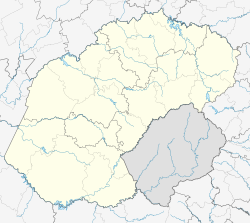Hobhouse, South Africa
Hobhouse | |
|---|---|
 Hobhouse, Dutch Reformed Church | |
| Coordinates: 29°31′41″S 27°08′29″E / 29.52806°S 27.14139°E | |
| Country | South Africa |
| Province | Free State |
| District | Thabo Mofutsanyane |
| Municipality | Mantsopa |
| Area | |
• Total | 12.6 km2 (4.9 sq mi) |
| Population (2011)[1] | |
• Total | 244 |
| • Density | 19/km2 (50/sq mi) |
| Racial makeup (2011) | |
| • White | 44.67% |
| • Black African | 42.62% |
| • Coloured | 8.61% |
| • Indian/Asian | 2.87% |
| • Other | 1.23% |
| First languages (2011) | |
| • Afrikaans | 43.44% |
| • Sotho | 38.11% |
| • English | 14.34% |
| • Other | 3.69% |
| Time zone | UTC+2 (SAST) |
| Postal code (street) | 9740 |
| PO box | 9740 |
| Area code | 051 |
Hobhouse is a small farming and homesteading town in the Free State province of South Africa. Maize, wheat, and livestock are produced here.
Background
The town lies 32 km north-east of Wepener and 51 km south-west of Ladybrand, near the Lesotho border. It was laid out on the farm Poortjie in 1912 and attained municipal status in 1913. It is named after Emily Hobhouse (1860-1926), author and philanthropist who brought to public notice abuses in concentration camps during the Anglo-Boer War.[2]
References
- ^ a b c d "Census 2011: Main Place: Hobhouse".
- ^ "Dictionary of Southern African Place Names (Public Domain)". Human Science Research Council. p. 212.



